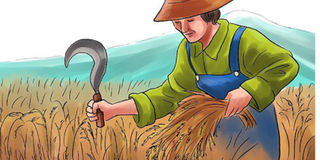Bobi and the farm director who didn’t know rice plant

Recently, I travelled to Busedde, a sub-county in Jinja District. Many years ago, I used to ride a bicycle to this village to buy charcoal, yellow bananas and jack fruit (ffene). I would pass former minister Daudi Migereko’s home and agriculturalist Victoria Sekitoleko’s.
A lot has changed here, but the old man who used to hire us as mercenary footballers for village soccer tourneys is still the same sharp young man he was in the 1990s. Of course, he couldn’t recognise me, but I did recognise him. I had to remind him of a particular match we played in Nabirama in 1998. He had said back then while celebrating that he would never forget that victory. True to his memory he still had it.
After exchanging a lot of pleasantries, he winced and said there was a small problem for which he could do with a little advice from a “town ace”.
“Baller, you know, there is a man here, rich and popular. But not a farmer. Now we are supposed to elect the leader for rice farmers here but this man wants in, he wants my endorsement which is a ticket to victory,” he said.
I told Hajj that since the man was rich and popular, he probably had the resources to mobilise for the good of the farmers.
Hajj clicked his tongue like Nixau (Xixo) in The Gods Must Be Crazy classic. “He can’t tell the difference between rice and Guinea grass,” he said.
“Do you know Guinea grass?” he suddenly asked as an afterthought.
It’s a name I had heard in agriculture class more than 20 years ago, but putting it to the present was not easy. I tried to dig up my memory to remember the efforts Messrs Ariko Okiror and Joseph Ongorok went through in teaching us livestock fodder but wapi.
“I know rice,” I said.
“I know. But this rich man doesn’t even know rice. If you gave him Panicum maximum and told him it was grass, he would nod his head and order for 100 bags when they mature for harvest,” he said with the seriousness of professional mourner.
“And what is the maximum panicake you are talking about?”
“Look here, Baller. I said Panicum maximum. It’s the botanical name of Guinea grass though now it is called by its sub-generic name Megathyrsus maximus,” he said as he walked me to the side of the road his eyes scanning around the overgrown grass along the road that led to Migereko’s village home.
He got what he was looking for, stepped over and pulled it. Then he wagged the grass in my face, saying “this is the thing. Show it to that man and say it is rice flowering and he will believe you.”
I was stunned. Guinea grass is what we commonly use for making brooms after it has flowered and matured. The grass is good fodder for livestock. Now, how was I to believe Hajj?
“Anyway, so what’s the big deal? He wants to lead, mobilise and facilitate the farmers, not to be the one in the swamp planting the rice,” I said.
“My concern is that if he can’t tell Guinea grass from rice plant just because the two grow vertically, then he has no business seeking leadership of rice farmers. He can keep eating the rice,” he said.
Turning his back to me like an Indian patriarch, Hajj went on: “Rice farming is not about saying you can appoint a team of technocrats and experts to oversee on your behalf as you sit somewhere as the governor, you have to at least know the basics… Imagine you are the rice growers cooperative chairman and you are invited to the UN FAO for a function and then confuse Guinea grass with rice plants, do you think your excuse that you don’t have to know everything to govern will bail you out?”
Hajj chewed on the blade of the Guinea grass. Then he asked: “What do you think, Baller?”
“Tell the man to go to studio and record a song titled Rice & Guinea Grass, it could do him more good than aspiring to lead rice farmers,” I said. He nodded and chewed on more blade of the Guinea grass.




